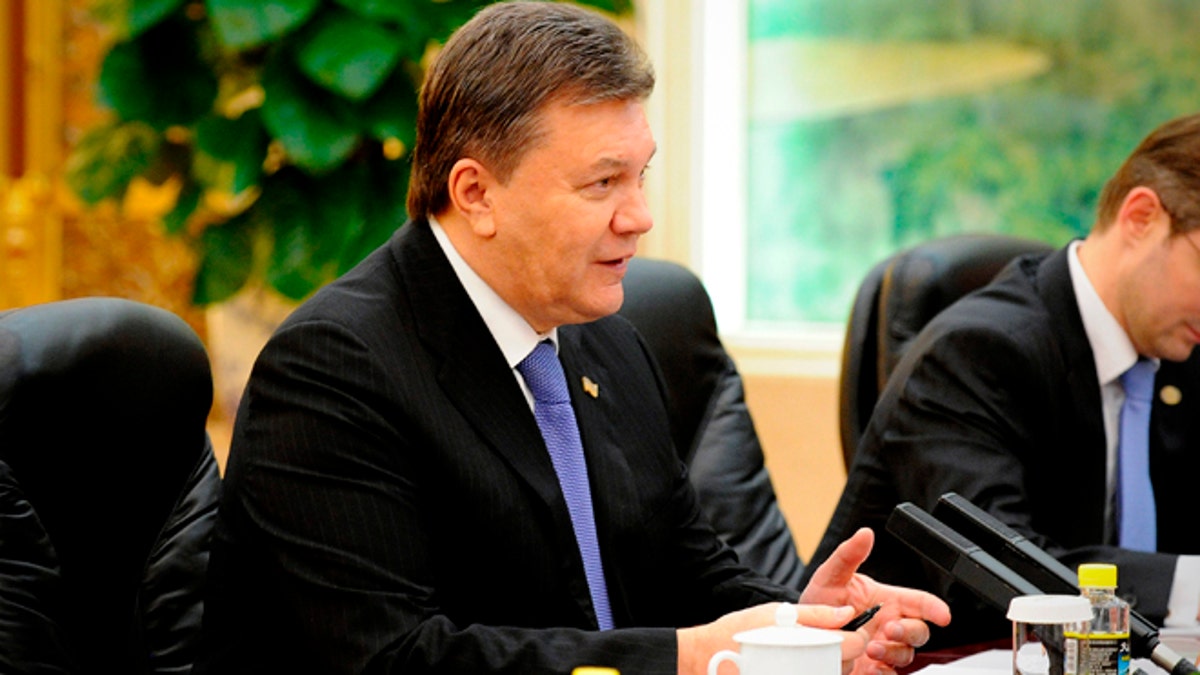
Dec. 6, 2013: Ukrainian President Viktor Yanukovych (L) meets with Chinese Premier Li Keqiang (not pictured) at the Great Hall of the People in Beijing. (Reuters)
KIEV, Ukraine – Ukraine's president will return Monday from a short sick leave that had sparked a guessing game he was taking himself out of action in preparation to step down or for a crackdown on widespread anti-government protests.
Viktor Yanukovych's office made the announcement about the president's return the same day as protesters seeking his resignation held one of their largest gatherings in recent weeks. About 20,000 people assembled at the main protest site in Kiev's central square on Sunday.
Yanukovych's sick leave was announced Thursday, with his office saying he had an acute respiratory illness. Some opposition leaders were skeptical about it, however, and thought Yanukovych was disappearing from the limelight in preparation for imposing a state of emergency amid the deepest turmoil in Ukraine since the Orange Revolution in 2004-2005.
The protests, which are heading into a third month, began in late November after Yanukovych backed away from a long-awaited agreement to deepen ties with the European Union. They quickly grew to encompass a wide range of grievances after police violently dispersed some of the early gatherings.
During Yanukovych's sick leave, a sense of stasis set in and neither side showed signs of movement. But his return to work could bring new action.
"Repression works in reverse. More people are coming to Maidan," said demonstrator Tamara Tribko, using the abbreviated name of the square where an extensive tent camp has been established since early December.
Top opposition figures spoke to the rally to urge supporters to push forward with their demands. Arseniy Yatsenyuk, one of the protest leaders, emphasized the importance of obtaining the release of all people arrested during the protests.
"We must free all," Yatsenyuk said, adding that there were 116 people being held. "Freedom to every hero."
Yanukovych's sick leave was announced the morning after the parliament voted to offer amnesty to many of those arrested during protests on the condition that demonstrators vacate some of the buildings they occupy in Kiev and government buildings elsewhere in the country.
The measure was greeted with disdain by protesters, who characterized it as the government essentially taking hostages and then using them to try to negotiate concessions. Kiev's city hall, which protesters have seized, is being used as an operations center and dormitory key to supporting the extensive protester tent camp on the nearby Independence Square.
Another protest leader, former heavyweight boxing champion Vitali Klitschko, showed that opposition hopes for cooperation from abroad are high.
"The crisis will end at last when under the auspices of the international community we will hold new elections that will stop the regime of Yanukovych," he said.
On Tuesday, parliament is expected to consider reforms to the constitution that would reduce some presidential powers and allot them to the prime minister. Yanukovych last week accepted the resignation of Prime Minister Mykola Azarov, but hasn't appointed a new one.
